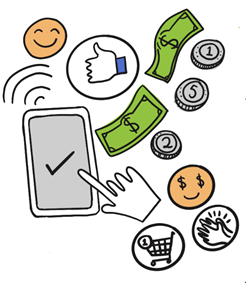In addition to her full-time job as an invoicing agent with a community Wi-Fi service provider, Heny sells mangoes. Fortunately for her, she’s able to use the public Wi-Fi network at her work to post pictures and announce the latest shipments of new produce to would-be customers.
Heny is just one of many who have benefited from a key component of meaningful connectivity. We define ‘meaningful connectivity’ as having four components: when someone has a (1) 4G connection (2) on a smartphone they own and (3) daily use of (4) an unlimited broadband connection at home, work, or a place of study. Through her access to a reliable, high-capacity Wi-Fi connection at work, Heny is able to post regularly and with higher quality photos that give her a competitive edge in selling mangoes within her community. She can make more sales and market more mangoes than others. Compared to another vendor in the same community, Rinie, who relies only on her mobile internet connection to sell mangos through e-marketing, Heny is able to sell three times as much in a day than what Rinie can in a week. In turn, Heny has built a reputation with several farmers for her reliability in getting a good price for herself and for farmers, too. Heny’s story is just one of many – of early advantage to those with greater connectivity and of frustrated potential for those who remain un- or under-connected.

As part of our latest research into women’s experiences online, we find that affordability and digital skills gaps remain stubborn barriers to gender-equitable access to and use of the internet. However, in addition to the digital gender gap – where a majority of men have used the internet but a majority of women have not – women are also less likely to have reliable access to a higher-quality connection that moves the internet from just being an incidental perk to a tool that enables someone to expand their horizons, personally, professionally, or otherwise.
We measure this higher quality through the meaningful connectivity framework. It can apply at the individual level – their access to each of the four indicators – and as a national assessment tool to focus on broadband policy discussions around potential targets for greater connectivity. Our initial surveys in Colombia, Ghana, and Indonesia show that in each of the three countries, the number of meaningfully-connected individuals is much lower than the number of internet users as measured by the International Telecommunication Union (ITU) and that women are less likely to be meaningfully connected than men. Clearly, much work remains to be done.
Around 9,700 kilometres away from Heny, in Cape Town, Grace, a cleaner at the University of Cape Town, can use the university’s network for her own connectivity and also to share it with her daughter, Dululu, for homework, educational games, and entertainment. Both Heny and Grace benefit from the opportunity to connect to the internet – and in turn, the wider world – through the reliable network available at their respective workplaces. This is not true for many, but in a world where a personal internet subscription remains unaffordable for millions, public access projects share the cost burden of connectivity among a wider number of users to benefit from a higher-quality connection, typically over Wi-Fi.
These public access points add to the mosaic of shared infrastructure and sharing strategies that individuals use to spread connectivity among family members and friends. Public access solutions scale the same logic of a shared mobile phone or SIM card to a larger number, spread the cost to more people, and create a new layer of cooperative economic efficiency where data tariffs keep millions offline.
‘Meaningful’ is a contested term. What constitutes ‘meaningful’? For Heny, the ability to share photos and post regularly on social media is the lifeblood of her marketing strategy, and that is widely acknowledged as productive. However, just spending time on social media sites has been reported in the media as bad for our health, our wellbeing, and our democracies. Is the fact that Dululu watches cartoons online a bad thing? The networks we built cannot pre-judge the ‘meaningfulness’ of the bytes it serves to users, and similarly our interpretations of when connectivity becomes meaningful should be open to someone’s individual flourishing and that path being unique to them.
But it’s a Catch-22 situation. We want meaningful connectivity so that women can make use of digital technologies, that will see women increasingly becoming knowledge creators and content producers. The reality is that, while being connected allows for faster engagement with customers, there is missing content from women. Our findings are reflective of this. Men were far more likely to engage in a range of online activities, including:
- Posting comments about political, social, or economic issues (men 29% more likely than women).
- Selling products or advertising a service (men 29% more likely).
- Publishing a blog post (men 22% more likely).
Without women’s full participation as creators, the internet will continue to be built with a bias towards male perspectives and miss out on the full knowledge, talent, and contributions of all of society. Working towards meaningful connectivity demands advocating for online spaces that will enhance women’s activities on digital platforms rather than silence them when they do join. It’s not just about being able to produce content and knowledge but also the trust and safety of being on digital platforms as we think of meaningful connectivity. Women are more concerned about their privacy online especially on personal information such asprivate messages, home addresses, and healthcare information. Those who participated in our focus groups shared the consequences of having their personal data misused – including experiencing and witnessing online harassment and online abuse. This increased online vulnerability with safety and security concerns means the right to privacy and data protection is particularly important when women engage with digital platforms.

In the end, we want a digital space that works for women and girls to fully make use of it for their entrepreneurial activities. Adopting the meaningful connectivity framework as a strategy to tackle the gender gap would be an initial step. The meaningful connectivity targets give a fuller picture of the quality of internet access people experience and can help policymakers design better policies to close the digital gender gap and connect more people to a useful, empowering internet.
But we must also go beyond the infrastructure. As digital literacy is a challenge, we advocate for the investment and promotion by governments and other key stakeholders in building up the necessary skills to use the internet and create content that would boost businesses. As these women go online to sell their products, there is also a need to ensure that they are included in designing and developing technology solutions for commercial transactions and supported in developing content as part of local content creation strategies. Most importantly, their safety must be assured. Both governments and companies have a role to play in keeping people safe by protecting the right to privacy – which in turn makes the web safer for women and for everyone.
Only by ensuring policies and solutions of addressing these challenges can we move toward a world where the internet becomes a force to achieve gender equality.
—




